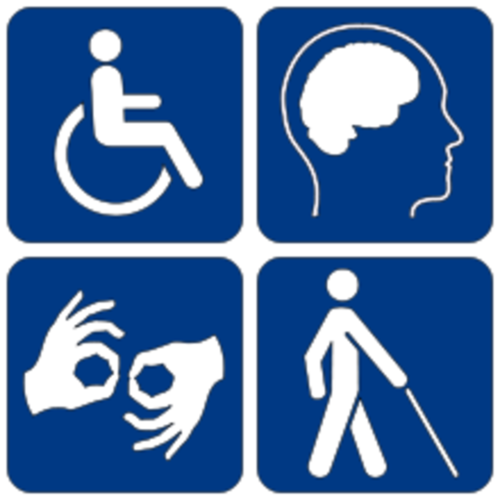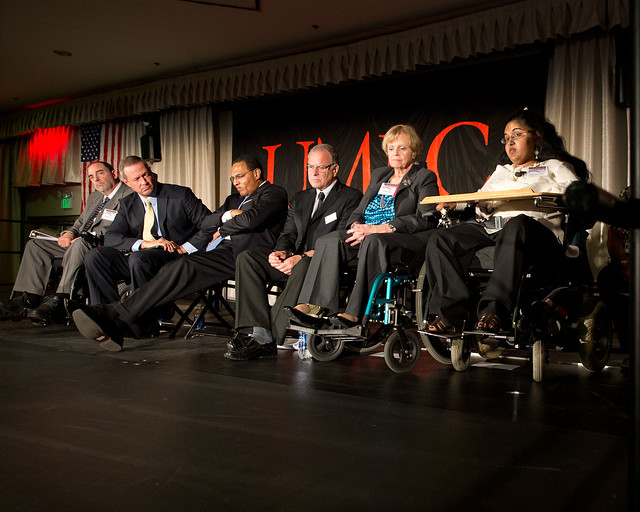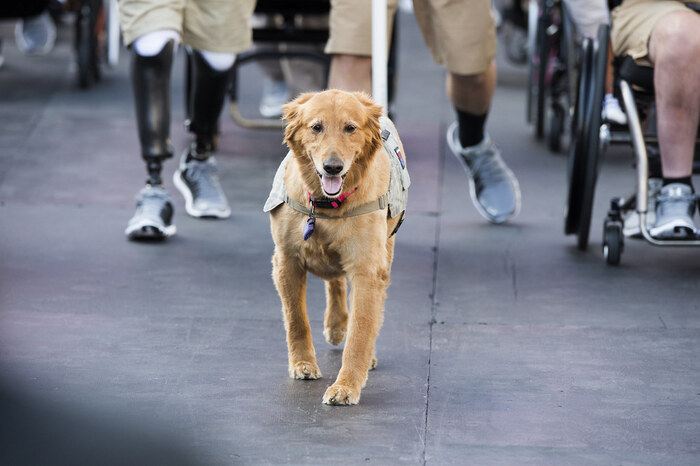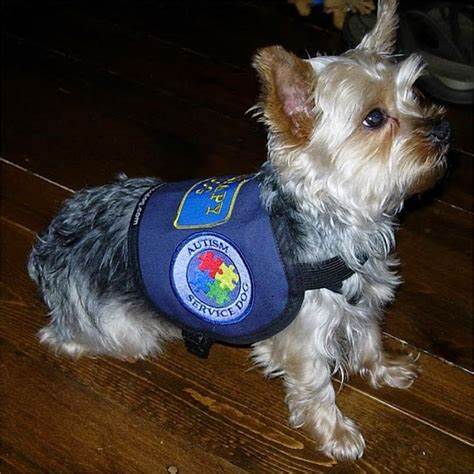- What is the ADA?
- What Do Titles I, II, III, IV, and V Stand for?
- What Are Service Animals?
- Definition of “Disability” According to the ADA
- Does the ADA Protect Emotional Support Animals (ESA)?
- Are the Terms Psychiatric Service Dogs (PSDs) and Emotional Support Animals (ESAs) Equal?
- Service Animals and Emotional Support Animals Onboard
- Do Service Animals Have to Be Professionally Trained?
- What Questions May Handlers Be Required to Answer?
- Service Dog Breed Restrictions
- When Service Animals May Be Denied Access?
- Is Allergy to Dog Fur and Fear of Dogs Reasons for a Service Animal to Be Excluded?
- Must Handlers Pay Fees Due to the Presence of Their Service Animal?
- May the Access of Service Animals to Certain Areas Be Restricted?
- Must Restaurants Allow Service Animals to Sit On the Chairs and Be Fed on the Tables?
- Are Service Dogs Required to Wear Special Vests/Harnesses/ID Tags?
- Service Animals Certification and Registration
- May a Handler Visit Public Premises With Their Service Animals off Leash?
- Do Your City Laws Comply with the ADA?
- Do You Have to Register and License Your Dog as Your City Requires All Dogs to Be Licensed and Registered?
- Do You Have to Vaccinate Your Service Dog, as Your City Requires All Dogs to Be Vaccinated?

Service animal - a term that has been becoming popular worldwide, especially among people coping with a physical and/or mental disability. Service animals are of great help for impaired people and help them overcome daily obstacles and lead a fulfilling life. However, the general pubic is still not fully aware of the meaning behind this term, and thus a lot of people (employers/employees/passerby) as well as some service dog handlers themselves, still do not know what rights and responsibilities service animals have.
In order to bring some clarification and ease the dialogue between both sides- service dog handlers and the general public, we will discuss the current Americans with Disabilities Act (ADA) regulations, and let you know what to expect in 2026.
What is the ADA?
The Americans with Disabilities Act is a civil rights law that protects the rights of people with disabilities in all areas of public life, such as schools, jobs, transportation, as well as all places (public and private) available for the general public. This law forbids discrimination against people with disabilities and ensures that they will have the same rights as everyone else.
“The ADA gives civil rights protections to individuals with disabilities similar to those provided to individuals on the basis of race, color, sex, national origin, age, and religion. It guarantees equal opportunity for individuals with disabilities in public accommodations, employment, transportation, state and local government services, and telecommunications. The ADA is divided into five titles (or sections) that relate to different areas of public life”.
The ADA is divided into 5 titles, that apply to different areas of public life.

What Do Titles I, II, III, IV, and V Stand for?
Title I (Employment)
The first title addresses the:
“Equal Employment Opportunity for Individuals with Disabilities”
According to this title, people coping with a disability must be provided with the same employment opportunities and have the same benefits that are granted to people without disabilities. Applicants or employees who are qualified for a certain job position must be provided with the so-called “reasonable accommodations”. The term “reasonable accommodations” means that the job or the work environment must be adjusted or modified in a way that allows the employee/applicant to fulfill their essential job functions/ to take part in the application process.
Employers whose number of employees is 15 or more, are required to comply with this law.
The Title I regulates the definition of the term “disability”, as well as the term “direct threat”, in case that there is a significant risk of major harm to the health and safety of an employee having a disability or others. Also, it provides guidelines for process of reasonable accommodation and handles medical examinations and inquiries.
Title II (State and Local Government)
The Title II addresses the:
“Nondiscrimination on the Basis of Disability in State and Local Government Services”
Qualified people with disabilities must have the same rights the people without disabilities in all activities, services and programs of public premises. This law applies to all:
“state and local governments, their departments and agencies, and any other instrumentalities or special purpose districts of state or local governments. It clarifies the requirements of section 504 of the Rehabilitation Act of 1973, as amended, for public transportation systems that receive federal financial assistance, and extends coverage to all public entities that provide public transportation, whether or not they receive federal financial assistance. It establishes detailed standards for the operation of public transit systems, including commuter and intercity rail (e.g., AMTRAK)”.
Title III (Public Accommodations)
This title addresses the:
“Nondiscrimination on the Basis of Disability by Public Accommodations and in Commercial Facilities”
According to this title private places of public accommodation must not discriminate people with disabilities. The term “public accommodations” features:
“privately-owned, leased or operated facilities like hotels, restaurants, retail merchants, doctor’s offices, golf courses, private schools, day care centers, health clubs, sports stadiums, movie theaters”...etc.
Title III requires business to provide the so-called “reasonable modifications” as needed to serve individuals with disabilities, i.e. barriers in buildings must be removed, in case that this can be done without investing much money or facing a lot of difficulties. Also, businesses must be able to communicate effectively with visually-, hearing- and speech-impaired customers.
Title IV (Telecommunications)
According to the fourth title the services in regard to the interstate and intrastate telecommunications that internet and phone companies offer must enable people with hearing and speech impairments to communicate via phone. Also, closed captioning must be available for public service announcements with federal funding.
Title V (Miscellaneous Provisions)
This title establishes various provisions in regard to the ADA in general, as well as how it relates to other laws and state immunity. Also, it addresses the impact of ADA on “insurance providers and benefits, prohibition against retaliation and coercion, illegal use of drugs, and attorneys’ fees.” Conditions that are not deemed “disabilities” are listed in this title as well.
After we took a closer look at the five Titles that the ADA is divided into, we will provide you with more information about service animals in particular, so that you know what to expect as a service dog handler.
More details can be found here.
What Are Service Animals?
The ADA defines service animals as dogs individually trained to perform specific tasks for the benefit of individuals with disabilities both physical and mental, and these tasks must be directly related to the person’s disability. We need to note that some states recognize miniature horses as service animals as well. The tasks that service animals can be trained to perform are various and depend on the needs of their owner. These tasks can be related to physical activities, requiring mobility and balance support, retrieving objects...etc., as well as with providing tactile stimulation for a calming effect.
The following two questions arise here:
-How is a disability defined?
-What is the status of assistance animals that provide comfort without performing specific tasks?

Definition of “Disability” According to the ADA
In order to receive protection under the ADA, a person must cope with a disability which is defined under the ADA as a:
-“physical or mental impairment that substantially limits one or more major life activities”;
-”a record of such an impairment” or
-”being regarded as having such an impairment”.
All types of impairments that are covered by the ADA are not specifically listed.
In general, we can say that some disabilities may be obvious, others, especially the ones related to the mental health of an individual, may remain unnoticed by the general public.
Does the ADA Protect Emotional Support Animals (ESA)?
No, ESAs can be all types of domestic species that provide comfort and companionship to their owners. They do not perform specific tasks related to the individual’s disability, thus do not have the same privileges. This means that if you want to visit any type of public setting with your ESA, he/she may be denied access. It depends on the pet policy of the facility, whether your ESA will be allowed or not.
However, we would like to note that ESAs still have accommodation rights guaranteed by the Fair Housing Act.
“They are animals that do work, perform tasks, assist, and/or provide therapeutic emotional support for individuals with disabilities. Importantly, assistance animals are not considered pets, and housing providers may not impose fees or deposits that are required for pets. There are two types of assistance animals: (1) service animals, and (2) other animals that do work, perform tasks, provide assistance, and/or provide therapeutic emotional support for individuals with disabilities (referred to in the guidance as a “support animal” but also called "assistance animals")”.
Are the Terms Psychiatric Service Dogs (PSDs) and Emotional Support Animals (ESAs) Equal?
Some of you may mix both terms. However, PSDs are not ESAs, as they are trained to perform specific tasks to mitigate the symptoms of a mental disability like anxiety, depression, PTSD...etc. These dogs are protected under the ADA, and their presence must be allowed on public premises.
“The ADA makes a distinction between psychiatric service animals and emotional support animals. If the dog has been trained to sense that an anxiety attack is about to happen and take a specific action to help avoid the attack or lessen its impact, that would qualify as a service animal. However, if the dog's mere presence provides comfort, that would not be considered a service animal under the ADA.”
In the first part of the article, we provided information about the public areas that are required to offer the same services to both individuals with and without disabilities as provide reasonable accommodations. Some of you are likely to ask- Can I travel with my service animal?
Service Animals and Emotional Support Animals Onboard
In the beginning of 2021 the U.S. DOT (U.S. Department of Transportation Air Transportation), changed the regulations governing, changed the rules governing service animals on planes after receiving over 15,000 comments. The final rule of the department in regard to service animals made significant changes to the current Air Carrier Access Act service animal rule. The rule was published in the Federal Register a few weeks later, which cleared the way for it to go into effect on Monday, January 11, 2021.
We will list several essential changes that came into effect with the new rule:
-Only dogs as species will be permitted in the passenger cabin as service animals;
-ESAs will no longer be permitted in the passenger cabin, as they do not have a status of service; animals.
-Psychiatric Service Dogs must be granted access to the passenger cabin, as they have a status of service animals.
If you are interested in gathering more information about the new airline regulations in regard to service animals, you can read our article: “New 2021 Rules and Restrictions for Flying with Service Dogs (and ESA)”.
Airlines require passengers to download, fill and submit a DOT form prior to departure if they want to travel with their service dog in the cabin. The form includes information about the handler, the service dog, the training organization/trainer (service dogs can be owner/self-trained, as the ADA allows handlers to train their dogs as service animals), as well as information about the dog’s veterinarian and its vaccination records.
You may wonder how airport agents and business owners can determine whether an animal is a service animal or not.
The following part of the sentence above “service dogs can be owner/self-trained, as the ADA allows handlers to train their dogs as service animals,” may have gotten your attention.
Do Service Animals Have to Be Professionally Trained?
No, US citizens can train their own dogs. However, any certification issued by a training school or an organization may help you prove that your service animal has completed a training program and acquired certain tasks. The ADA states:
“No. Covered entities may not require documentation, such as proof that the animal has been certified, trained, or licensed as a service animal, as a condition for entry.”
What Questions May Handlers Be Required to Answer?
Handlers may need to answer the following two questions:
1. Is this a service animal due to a disability;
2. What tasks has the service animal been trained to perform;
If you and your paw friend finished a training course, the tasks that he/she has been trained to perform, are likely to be listed on the certificate or to be available in the learning plan. However, you can just explain with your words what your service dog does for you to alleviate your symptoms and help you deal with daily challenges.
If you are into bully breeds like American Bulldog, American Pit Bull Terrier, Bull Terrier, Boxer...etc., you may wonder if your dog will be denied access due to his/her breed.
Service Dog Breed Restrictions
The ADA does not limit the dog breeds that can become service animals. Moreover, service animals must not be discriminated against based on their breed only.
You may wonder if there are situations where service animals may be denied access to public premises or to the aircraft.
When Service Animals May Be Denied Access?
The ADA defines the situations when service animals may be asked to leave the premises:
“However, if a particular service animal behaves in a way that poses a direct threat to the health or safety of others, has a history of such behavior, or is not under the control of the handler, that animal may be excluded. If an animal is excluded for such reasons, staff must still offer their goods or services to the person without the animal present.”
Is Allergy to Dog Fur and Fear of Dogs Reasons for a Service Animal to Be Excluded?
No, employees are not allowed to prohibit the presence of service animals due to allergies to fur or fear of dogs. If a customer or another person in the premises is allergic to dogs / afraid of dogs, both this person and the handler-dog team must be offered accommodation by assigning them to different locations of the premises if possible.
Must Handlers Pay Fees Due to the Presence of Their Service Animal?
No, additional fees may not be charged due to the presence of the service animal. If a business charges fees for pets, these fees can not be applied to service animals, as they are not considered pets, but medical equipment. Fees also may not be charged due to the process of shedding of the service animal, which requires the hair to be cleaned up. However, if the service animal causes any damage in the premises, his/her handler may be held responsible and required to pay a fee for the damage.
You already know that you may not be required to pay a fee for your service dog, but you may wonder if their presence may be restricted to certain areas in the public premises.
May the Access of Service Animals to Certain Areas Be Restricted?
No, premises are not allowed to limit the access of the handler and their service animal to all areas available to use by other guests. Handler-dog teams must be offered the same services as other customers, may not be isolated from them, or treated differently.
Must Restaurants Allow Service Animals to Sit On the Chairs and Be Fed on the Tables?
Service Animals are only allowed to accompany their handler on the premises. Restaurants are not required to allow service dogs to be seated/fed at the table.
Other important questions that may concern many handlers are related to service dog gear as a type of identification.

Are Service Dogs Required to Wear Special Vests/Harnesses/ID Tags?
No, the ADA does not require handlers to put any special service dog gear on their service dogs such as a harness, a vest, or an ID Tag. However, these may be helpful while in public, as they will notify passerby that the dog is a working animal, and just a pet and they may not distract or pet him/her. Whether to put such a gear on your service dog or not, depends on you, your preferences and what message you would like to send to the general public through these accessories.
Many handlers are trying to register their service animals in order to verify their legitimacy.
Service Animals Certification and Registration
According to the ADA, service animals are not required to be registered or certified. Moreover, there is no official service dog registry in the US:
“There are individuals and organizations that sell service animal certification or registration documents online. These documents do not convey any rights under the ADA, and the Department of Justice does not recognize them as proof that the dog is a service animal”.
We highly recommend that you complete a training program that will provide you and your dog with the knowledge needed for you both to become a good handler-dog team. You may want to ensure that your dog will behave properly both at home and in public and will be able to perform the tasks you want them to, anytime you need. By buying a certificate, you do not prove the legitimacy or the skills of your service animal. Training and raising a dog, especially a service dog, is a lifetime goal that requires time, energy, discipline, patience, consistency, and commitment.
May a Handler Visit Public Premises With Their Service Animals off Leash?
No, service animals must be leashed, harnessed, or otherwise tethered at all times while in public, unless these devices impede the ability of the animal to do his/her work. In case the use of a leash/harness or another type of gear will interfere with the task performance, the handler still must be able to keep the service animal under control. Handlers may use vocalization or hand signals to give their service dog commands and ensure that he/she is under control.
We would like to clarify an important question:
Do Your City Laws Comply with the ADA?
We will discuss a few scenarios:
Do you have to register your dog as a service animal due to your city's laws?
No, the ADA states, that mandatory registration of service animals is not permissible.
Do You Have to Register and License Your Dog as Your City Requires All Dogs to Be Licensed and Registered?
In this case, you have to abide by the law as “local dog licensing and registration requirements”.
Do You Have to Vaccinate Your Service Dog, as Your City Requires All Dogs to Be Vaccinated?
Yes, you have to follow the local laws in this case.
We hope that we managed to clarify the ADA regulations and what you, in your role as a service dog handler, can expect in 2025. If you want to learn more about the disability rights laws in the US, please see this page.










